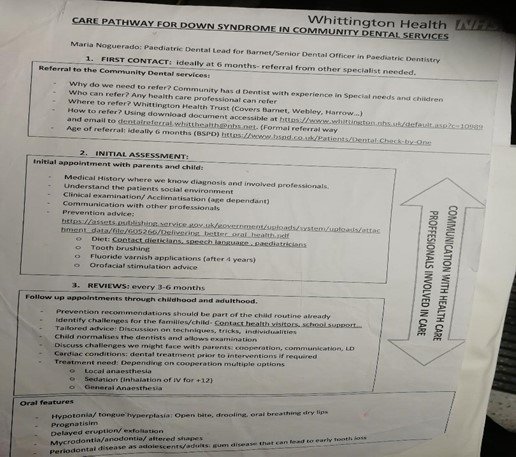Appendix 22 - Dental information and referral form
DSMIG guidance on dental care:
https://www.dsmig.org.uk/information-resources/by-topic/dental/
https://www.bspd.co.uk/Patients/Dental-Check-by-One.
In Barnet we refer to the Whittington Health Paediatric Dental service.
“The best time so see a patient is as soon as teeth come through. The British Society of Paediatric Dentistry recommendation is at age 1. It would be ideal if we saw them directly in the Community services as there are some considerations to their care that need to be taken into account and high-street Dentists are not always ready to support parents on their needs. If when they are older, the dentist believes they can be treated in normal high street the patient will be referred out of the service. Your team can make the referral directly to our service online. It would ideally be picked up and placed in a Senior Dental Officer diary.
On an initial appointment to the dentist the parents will be informed about the assessment, prevention advice and diet recommendations. Obviously an oral exam is performed as well. Discussion about fluid thickeners, timing of medication and feeds will also be relevant to dental care, and timetabling these to optimise dental care (reducing acidity). In addition, advice about palatal shape, tongue positioning and other anatomical issues would be discussed with parents by the senior dental officer.”
(Discussion with Maria Noguerado, Senior Dental Officer in Paediatric Dentistry, 2019)
Referral to be made at 12 month review.
Paediatric Dentistry referral form (Children 15 years old and younger)
There is also a leaflet online… Dental Services
The referral will be triaged and the family sent to one of the clinics around Barnet.
There is another form that can be downloaded too for those older than 15 years.
Paediatric Dentistry
We specialise in the dental treatment of children who cannot be treated in general (or "high street") dental services.
Examples include young children that have
severe anxiety and not able to cooperate, or who may need a general anaesthetic
physical or learning disabilities
medical conditions that require special provision
'Looked after' children
NOTE: Access to this specialist service is by referral only.
How to make an appointment
If you are already a patient of our service, you can contact our head office on 020 3317 2353 to arrange a suitable appointment.
If you have been referred to our service, we will contact you to arrange an appointment.
For the Eastman dental appointments - uclh.referrals.edhappts@nhs.net
IF A GENERAL ANASETHETIC IS NEEDED – CAN THE ROUTINE BLOODS BE DONE AT THE SAME TIME?
Other dental Guidelines:
UK National Clinical Guidelines in Paediatric Dentistry: Guideline for the Use of General Anaesthesia (GA) in Paediatric Dentistry (May 2008). Authors Dr. Caroline Davies (Consultant Paediatric Anaesthetist) Mr. Mike Harrison (Consultant in Paediatric Dentistry) and Prof. Graham Roberts (Professor and Honorary Consultant in Dental Paediatrics)
Clinical Guidelines and Integrated Care Pathways for the Oral Health Care of People with Learning Disabilities 2012
BSPD National Guideline for appointment of Paediatric Dentists with Special Interest https://www.bspd.co.uk/Portals/0/DWSI%20Paed%20Dent%20guidelines%20V4.pdf
Helpful resources for visiting the dentist:
Going to the dentist and Makaton dental prompt cards:
Dentist: Makaton symbols and signs
Going to the dentist - a positive experience - video:
Oro-desensitisation programmes can be helpful for tolerance of teeth cleaning e.g. neonates/ children with PEGs and to reduce the impact of negative oral experiences during/after a period of invasive medical interventions. This is done through messy play as children need to desensitise through their other senses of touch/sight /smell and the oral acceptance of new foods is the last steps to eating. Dentist needs to work with the paediatric Dysphagia team.
Oromotor exercises and dental outcomes: see Appendix 26b.
